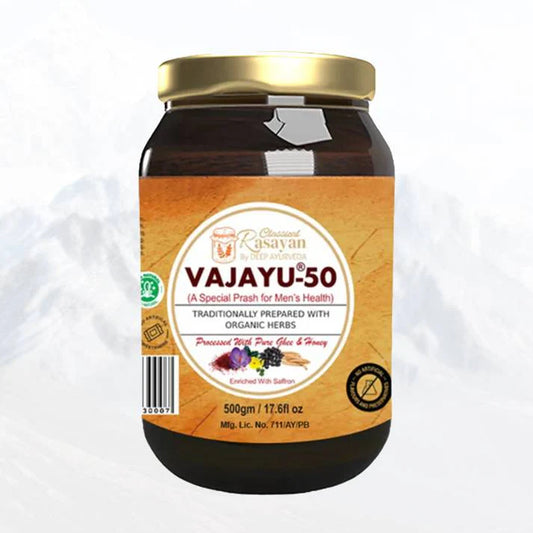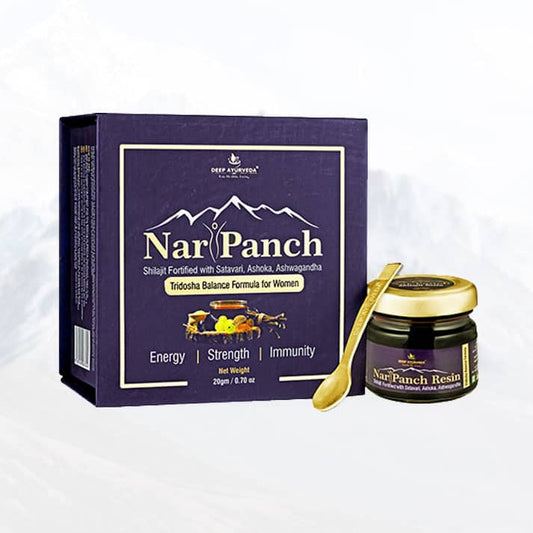According to Ayurveda, the primary cause of various issues in our lives – physical, mental, social, familial, relational, economic, and spiritual – is stress on the body and mind.
Stress is considered to be "sahasa" in Ayurveda. Sahasa results in ojahksaya, which means not to be a major causative factor for the various diseases, not only in Ayurvedic science but also in modern medicine. The stress is called sahasa. Sahasa results in ojahksaya, meaning a loss of immunity, and the body becomes prone to suffering from diseases.
The best way to have Stress management is by not falling into it. In the absence of it or at most in its inevitability, it is important to take care of diet, sleep (in the sense that the body should receive enough rest), and most importantly, to maintain health to protect the body. The second is consuming a variety of rasayana herbs consistently to improve the body's ability to manage stress.
These rasayanas have shown signs of stress relief in animal studies, and research is underway to make this herbal rasayana effective for stress management.
What are the Causes and Effects of Stress?
- Extreme mental stress & Anxiety
- Lot of work
- Boring lifestyle
- Major life challenges
- Being in a stressful situation
- Situations or their outcomes are out of our control
- Insufficient engagement in work, hobbies, or interests
- Experience discrimination, hatred, or abuse
- Traumatic incidents
Effects of Stress:
The effects of stress can be seen in many aspects of both physical and mental health. Common indicators of stress include experiences like -
- Chest pain
- An accelerated heartbeat
- Constant tiredness
- Trouble with sleep
- Physical symptoms like dizziness, headaches, shaking, and nervousness
- Fluctuations in blood pressure levels
- Jaw clenching
- Muscle soreness and tension
- Stomach problems
- Low Sex drive,
- Weak immune system
- Feelings of anxiety, depression, or extreme sadness
- panic attack occurrences
Here are some other unhealthy coping mechanisms that people may use to deal with stress:
- Smoking
- Consuming alcohol excessively
- Drug consumption
- Eating too much
- Not taking care of their health
- Sleeping excessively
- Participating in aggressive behaviors related to sex, shopping, or other activities leads to overspending.
What is the Ayurveda's Perspective for Stress and Anxiety
According to Ayurveda, most people's bodies have a bi-doshic constitution, which includes Pitta-Kapha, Vata-Kapha, and Pitta-Pitta. These three energy levels, or doshas, specify how much positive and negative stress is present in a person's body. Here’s how each dosha relates to our feelings and behaviors:
1. Vata dosha: This dosha improves our quick thinking abilities, unlocks our creativity and innovation, and enhances our intuitive power. People with a dominant Vata dosha may face life situations that cause them anxiety. When dosha levels rise, people may experience fear, anxiety, insomnia, isolation, and other negative emotions.
2. Pitta dosha: Pitta dosha gives us drive, smarts, a competitive spirit, and confidence. If Pitta gets too high, it can make someone feel angry, annoyed, frustrated, or not good enough. It can also lead to physical issues like sweating a lot, heartburn, diarrhea, and high blood pressure.
3. Pitta Kapha: This energy is linked to being strong, steady, and reliable. People with a lot of Kapha might not like change and can be very stubborn. If Kapha increases, it can cause stress through overeating and feeling unmotivated, tired, or sluggish.
What are the Effective Ayurvedic Treatments for Stress & Anxiety?
- Swedana - Herbal steam therapy for toxin release
- Abhyanga - Warm oil massage to rejuvenate the body
- Pizhichil - Muscle toning therapy with an oil bath
- Shirodhara - With this method, calming the nerves is done by continuously pouring the forehead with herbal oil.
- Shirovasthi - Therapy that rejuvenates and keeps the nervous system reinforced by retaining warm medicated oil at the head, which is sealed using a special cap.
- Thalam: Applying herbal preparations to the head to calm the nerves is known as this practice.
- Thalapothichil - This is the application of a paste over the head for the soothing of the nerves.
- Njavarkizhi - Therapy for natural stress relief, done in the form of a massage with pouches containing medicinal rice paste applied all over the whole body.
- Elakizhi - A massage applied by pressing hot sachets filled with medicinal herbs.
What Ayurvedic Supplements are Good for Stress Management?

Ayurvedic medicine includes a wide range of remedies and ingredients that help with stress management. Here are some of the most effective Ayurvedic supplements for stress and anxiety.
- Khseer Bala Oil For Relaxation and Sleep - A traditional Classical Ayurvedic oil made out of a combination of Ayurvedic herbs, oils, and milk used traditionally in the Panchakarma of therapies for Shirodhara therapy. This is tailor-made for Shirodhara therapy. It is known for its nourishing and rejuvenating properties, making it ideal for this treatment.
- Stress Ayurvedic Management - Stress is the most common reason for the development of various health issues. In these regards, some amazing herbs in Ayurveda can help manage the symptoms and disorders of the central nervous system. The Ayurvedic Stress Management Program will be facilitated under the guidance of experts in Ayurvedic philosophy to enable you to inculcate techniques to reduce stress and enhance the clarity of your thoughts. You will learn precise breathing methods, lifestyle approaches, and even herbal medications that are going to assist you in restoring your control and balance to, therefore, restore your harmony.
What Yoga Postures are Good for Stress and Anxiety Relief?

Most people will manage their anxiety with a combination of approaches, including therapy, changes in lifestyle, and often alternative treatments such as yoga.
Note: Anxiety disorders affect about 40 million adults aged 18 years and older, constituting 18.1% of the U.S. adult population every year. They are treatable, but unfortunately, only about 40% of people receive help.
Research studies have shown that yoga helps with stress and anxiety. These yoga postures work as Stress management as they help calm an overactive nervous system through the assistance of relaxation in both the mind and the body. Thus, here I am showing a few yoga asanas that you can practice for relief from anxiety and stress.
- Balasana (Child’s pose)
- Uttana Shishosana (Extended puppy pose)
- Matsyasana (Fish pose)
- Paschimottanasana (Seated forward bend)
- Uttanasana (Standing forward bend)
- Leg up the wall pose
- Baddha Konasana (Reclining bound angle pose)
- Janu Sirsasana (Head to forward knee bend)
- Virasana (Hero pose)
- Vrikshasana (Tree pose)
- Trikonasana (Triangle pose)
You can also try doing other types of yoga poses, like Sun Salutations or Surya Namaskar, in addition to these yoga poses.
Additional Tips for Effective Stress Management
- Make a schedule for each day. Make a schedule to help you feel more organized and manage your time better. Include regular meals, family time, exercise, chores, and leisure activities.
- Prioritize sleep - Getting enough rest is essential for both physical and mental health. Follow good sleep habits:
- Keep a regular wake-up and bedtime routine.
- Make your bedroom peaceful, dark, and cozy.
- Limit your screen time before night.
- For improved digestion and restful sleep, take into consideration Ayurveda's recommendation to eat a light dinner three hours before bed.
- Stay connected - Keep in touch with loved ones to share feelings and reduce stress.
- Eat healthily - Maintain a balanced diet with regular meals and plenty of fruits and vegetables. Stay hydrated.
- Reduce your news intake—too much exposure to the news can make you more stressed. Limit screen time and place mental health first.
Get Help with Stress Management with Ayurveda
Last but not least, remember to look after yourself. Stress management is an important aspect of both mental and physical health, and it is perfectly normal to require some help.
What to Expect from Our Stress Management in Ayurveda Program:
- Reduce aches and pains
- A new sense of freshness
- Relaxes both the body and mind
- Improves sleep patterns
- Increases emotional stability
- Boosts immunity and general health
If you need help managing stress, make an appointment with Dr. Baldeep Kour at Deep Ayurveda.
Together, we can discuss about the next steps and what kind of care will work best for you.







